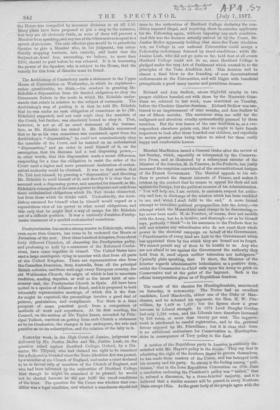The Archbishop of Canterbury made a statement to the Upper
House of Convocation on Wednesday, in which he explained— rather questionably, we think,—his conduct in granting Mr. Ridsdale a dispensation from his fancied obligation to obey the Ornaments Rubric in the mode in which Mr. Ridsdale under- stands that rubric in relation to the subject of vestments. The Archbishop's way of putting it is that he told Mr. Ridsdale that he was under no such obligation of conscience as he (Mr. Ridsdale) supposed, and not only might obey the mandate of the Court, but further, was absolutely bound to obey it. That, however, is not at all an exact statement of the transac- tion, as Mr. Ridsdale has stated it. Mr. Ridsdale announced that so far as his own conscience was concerned, apart from the Archbishop's " dispensation," he could not conscientiously obey the mandate of the Court, and he insisted on an ecclesiastical "dispensation," and an order to avail himself of it, on the assumption that his diocesan had a real dispensing power,— in other words, that this dispensation made a moral difference, suspending for a time the obligation to resist the order of the Court until a higher and more permanent declaration of ecclesi- astical authority could be obtained. It was to that notion that Dr. Tait lent himself, by granting a "dispensation" and directing Mr. Ridsdale to avail himself of it, and thereby it is clear that he assumed such a dispensing power, and asserted for himself, in Mr. Ridsdale's conception of the ease, a power to dispense not only from those ecclesiastical obligations which Dr. Tait thinks chimerical, but from those which he thinks valid. Undoubtedly, the Arch- bishop assumed for himself what he himself would regard as a superstitious view of his power to relax moral obligations, and this only that he might find a way of escape for Mr. Ridsdale out of a difficult position. It was a curiously Jesuitico-Presby- terian treatment of a morbid ecclesiastical conscience.


































 Previous page
Previous page